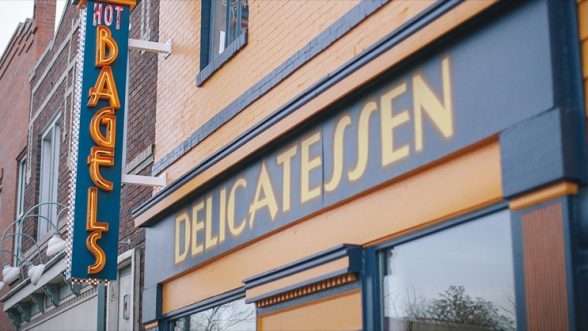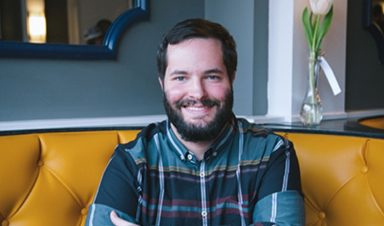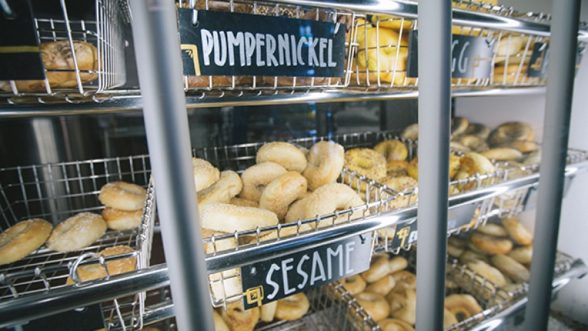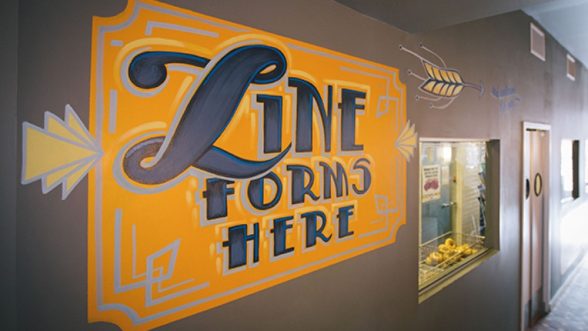
The winds of change sweeping the nation on Wednesday, Nov. 9, are nothing new to Josh Pollack. He’s seen plenty of shifts in the past year.
His bagel store in Denver’s Five Points neighborhood, which proved an immediate success upon opening two years ago, sustained a major setback last May when an early morning fire broke out in one of the apartments above the business. The blaze damaged the back two-thirds of Rosenberg’s Bagels & Delicatessen, forcing a lengthy closure for repairs.

Pollack is the founder of Rosenberg’s and a graduate of the Entrepreneurship Program at the CU Denver Business School.
“All the support we got – from the community, our peers in the food industry, people at CU reaching out – has been amazing,” says Pollack, who saw his business reopen in October to a huge line of customers waiting at the door. “It made me feel warm and fuzzy in a really difficult situation.”
Time to reboot
Instead of the fire striking a death blow to his business, Pollack turned the five-month shutdown into an opportunity to quite literally rise from the ashes. He did some volunteer work, sorted out how to reboot Rosenberg’s, and fine-tuned plans for several new stores on the horizon. In recent months, Pollack served as a guest speaker in a branding class taught by Jung Park in the CU Denver Business School, and he met with some entrepreneurs working on business proposals for the Jake Jabs Center for Entrepreneurship Business Plan Competition.
“I love encouraging people to do the competition the most,” says Pollack, who finished second in the 2012 event, pocketing $2,500 toward his bagel-store ambition. “The CU Denver Business School in general is fantastic, but I think if you want to be an entrepreneur there’s no better way than entering that competition. The resources are incredible because you get feedback from peers reviewing your plan, and from actual venture capitalists and bankers in the real world. You also get to practice your pitches and really dial your plan in.”
One of Pollack’s favorite classes in the Entrepreneur Program was an Entrepreneurial Finance course taught by Elizabeth Cooperman, PhD. The concepts taught in that course, such as the cash-to-cash cycle, have helped him optimize cash on hand to operate his business.

Another key takeaway from the program, Pollack says, is that business plans are living organisms, not documents set in stone. The fire and its challenging aftermath – the long waits for insurance payments (he’s still waiting on the last payment) – only reinforced to Pollack the shape-shifting nature of business ownership and of business plans.
Lessons from Business School
“I learned from my CU Denver classes how to negotiate terms with suppliers,” he says. That became important because Pollack had to occasionally float credit with vendors until insurance payments slowly trickled in. Also coming into play, as he regrouped for Rosenberg’s reopening, were restructuring employee training modules, re-costing supplies, and focusing on pro formas for the upcoming store locations.
Pro formas are figures based on previous business operations used for financial estimates. While confident in the business plan he wrote for the Jake Jabs Center for Entrepreneurship Business Plan Competition, Pollack says there’s nothing like running a startup to see how a business will actually perform. “With two years of data (from operating Rosenberg’s), I think I’ll be pretty accurate on my pro formas for the upcoming businesses.”
New ventures, improved efficiencies
Pollack will open a walk-up window, serving authentic New York-style pizza, in the 715 Club located just around the corner from Rosenberg’s in Five Points. Also next year, he plans to open an Italian delicatessen in Curtis Park and a second Rosenberg’s location in Stapleton’s Stanley Marketplace.
During the repair period, Pollack established a commissary kitchen in another Denver location. By prepping much of the food for Rosenberg’s, the commissary creates efficiencies and ensures quality control. The commissary, which was part of his original business plan, will be used for the new restaurants as well.

Preparing for the new operations proved a godsend for Pollack, as he endured $150,000 in out-of-pocket expenses immediately after the fire. “I don’t know if we would have survived if we didn’t have some savings for the other businesses on hand,” he says.
‘What doesn’t kill you …’
The commissary is also now home to the reverse-osmosis filtration device that gives Pollack’s bagels their authentic Empire State quality. The machine strips minerals out of the Denver water and then adds them back – in precise parts-per-million ratios that mimic New York City water. The water, plus a high-moisture environment, strengthens the gluten, which, as Pollack tells you, is what any good bagel or pizza maker does.
Sometime around late 2017, the entrepreneur will endeavor on another wave of expansion. This time he plans to open multiple new bagel locations at once, an approach that offers economies of scale.
His original formula for the Business Plan Competition called for five stores in 10 years, so, even despite a significant setback, which was found to be caused by arson in the upstairs apartment (a man has been charged), Pollack is on track to reach his goal.
The young businessman, much like his stout New York-style gluten, clearly knows how to bounce back. “What doesn’t kill you makes you stronger,” he says, closing the books on another busy day at his signature Mile High City delicatessen.


